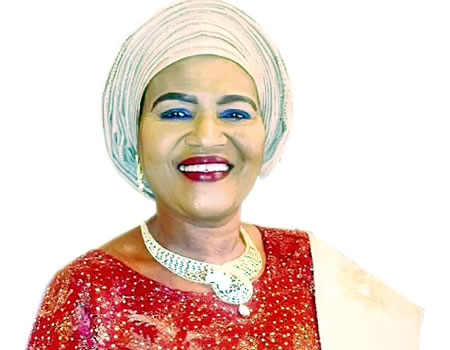Where did you start from before getting to where you are today?
I was born in Lagos into a very large family, because my father was a twin and we all lived together in the same household. So, I have about twenty other siblings and my parents were traders. When I finished my secondary school education, I went to Ogun State Polytechnic, now Moshood Abiola Polytechnic, where I studied Secretarial Administration. I graduated in 1982 and served at the National Institute for Policy and Strategic Studies, Kuru, Jos, Plateau State. It was while serving that I met my husband, he is from Edo State. Most people thought it was a youth corps affair but thank God, we are still together, today. After service, I started work at Ogun State University as a secretary. I rose to the position of a personal secretary, but I was not satisfied, I wanted to read law and kept on applying for a direct entry. I did that for almost four years but when I didn’t get admission, my husband advised me to write Joint Admission and Matriculation Board (JAMB) Examination after two children. That was exactly what I did in 1989 and here I am today.
Why did you study law to PhD level?
I got admission into the Ogun State University now Olabisi Onabanjo University in 1989 and graduated at the top of my class in 1992/1993 session. I got seven prizes at the university and I went to the Law School, where I got three prizes. After the Law School, I started lecturing at the Olabisi Onabanjo University, but I later got scholarship to do my Masters at the University of Pretoria, South Africa, because I did well after my Masters, I was offered admission to do my doctorate. I was reluctant to do Doctorate in Law at first because it meant leaving my family again, but my husband encouraged me to do it. I did it, and today the rest is history. I was appointed a professor on February 2015.
How were you able to combine your academic pursuit with the home front?
It was not easy, but a result of determination to succeed. I went on study leave without pay, so there was no salary to fall back on, we had to survive on my husband’s salary. He was an assistant lecturer at that time. I used to wake up at 4.00 a.m every day; I will study for 45 minutes before going to the kitchen to prepare breakfast and get the children ready for school, then we would all go our different ways. I used to wash family clothings twice a week. It wasn’t easy at all but God saw me through. My husband was also doing his doctorate at Ife at the time. He lectured at OOU before moving to University of Ife. He is now the Dean of the Faculty of Technology. He is a professor too. He was very supportive and always willing to assist me.
Why did you focus your research on women’s right?
My research is focused on Human’s Right with specific emphasis on women’s right because of discrimination against women. Initially, when I was working as a secretary, I observed that my leave bonus was half of what a male (married) was given. The men were collecting 96, while we collected 48, this got me angry because we were on the same salary scale and we were doing the same work. There was no proof that being a woman was affecting my productivity, and that made me see some of the injustice in the civil service of those days. I also discovered that unmarried pregnant ladies, were not given maternity leave. I used to question it that what was important was that the girl was married and is working so she is entitled to it. I felt that the person who is not married needed more support, so, to deny them maternity leave was wrong. Also, immediately I got married, I lost my housing allowance and it was a big chunk almost 20 per cent of my salary. They said because I am married, I am expected to stay with my husband. When we could add the money together and get a bigger accommodation since we would be starting a new family. I was told that was the rule, if husband and wife work in the same place. They didn’t even ask us that who will forfeit it out of both of us, they just stopped mine automatically. Another thing that motivated me to focus on women’s right was that a man beat his wife to death on my street. He is still walking the street up till today as a free man. Three months later, another woman who had eight children for her husband was beaten to death too. All these provoked my interest in human right, domestic violence, abuses and so on. When I was doing my doctorate at the University of Pretoria, I compared aspect of gender equality under Nigerian and South African laws. Although South Africa has a lot of laws that protect women, but their women are not protected in the real sense of it because you can’t change the way of life of people by law. You have to educate them. In South Africa, a woman is raped every 26-second. I was shocked to find men raping minors when I was there. It was strange to me then but it has now become obvious that such things happen in Nigeria too but were not reported because we have a culture of silence. However, the Nigerian society is more open now with the advent of human right so, we read such stories in the papers now. In the past, if a girl that is raped sees it as her fault, it didn’t matter then that the person that raped her had eroded the confidence reposed in him as most people are raped by people they know such as uncles, cousins and so on. It was because of the second victimisation of the victim that people don’t want to talk when they are raped. The culture of silence is over, if you are raped, speak out.
How can parents protect their children from rapists?
Women need to give more attention to their children. It is unfortunate that most parents don’t have time for their children because of the socio-economic situation of our country. We rely on other people to take care of our children. Even, when they are on holiday, we still send them to holiday coaching, whereas that is an opportunity to bond with the children. We should always take care of our children.
Despite the fact that some states have enacted laws on domestic violence and sexual abuse, rape is on the increase, what do you think is responsible for this?
We can blame the increase in rape cases on the internet which gives access to pornography. After watching it, they usually have the urge which they have to satisfy. That is why parents need to monitor their children, dedicate time to educate them to delay gratification till the future. That is why crime is on the increase too as people want quick money. They should teach their children to focus on their education like we were told in our own time.
The girl-child is still seen as a second-class citizen, what can be done about this?
It is still about orientation. I met someone recently who wanted to marry another wife because his wife had only one son for him. I told him that what is the guarantee that the new wife will give him a son. It is wrong to discriminate against girls and boys. We should always have it at the back of our minds that there is nothing a boy can do that a girl cannot do. We should, therefore, treat our boys and girls equally and stop seeing girls as second-class citizens.
Advice for young people?
They should focus on their studies. Their future is in their hands, they can make whatever they want out of it. They should also note that age and marriage are not barriers, they can be anything they want to be in life. Don’t bury your potentials, pursue your dreams and be whatever you want to become. Know that there is dignity in labour, so, work hard and be dedicated. When I went back to do JAMB people mocked me, today, I am the first person to become a professor out of all those who studied law at Ogun State University. You too can still make a lot of first. With God on your side, nothing is unattainable. Husbands too should support their wives.






